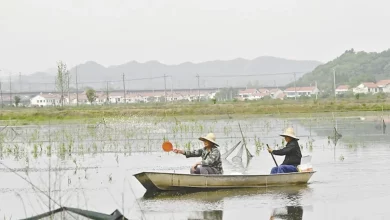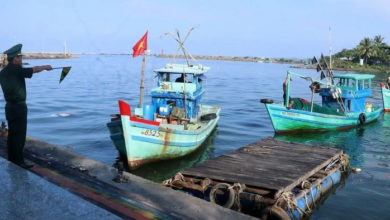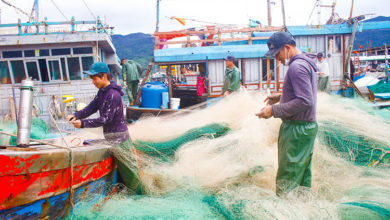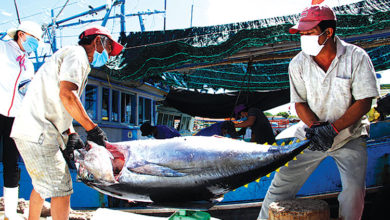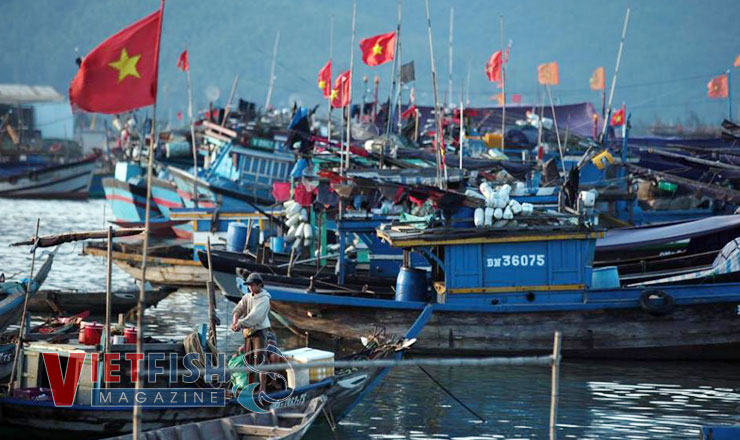Kien Giang: Identifies fishing vessels to combat illegal fishing
In an effort to crack down on illegal, unreported, and unregulated (IUU) fishing, Kien Giang province has been implementing various measures, including a fishing vessel identification system.
Over 9,900 fishing vessels registered
This initiative is part of Vietnam’s broader goal to lift the European Commission’s (EC) “yellow card” warning on its seafood exports.

As of January 11, 2025, Kien Giang had the largest fishing fleet in Vietnam, with 10,034 vessels. Of these, 4,999 vessels (12 meters or longer) are managed at the provincial level, while 5,035 smaller vessels (6 to under 12 meters) fall under district-level management.
To strengthen oversight and ensure compliance with EC regulations, Kien Giang became the first of 31 coastal provinces and cities to launch a fishing vessel identification program. The initiative integrates the national fisheries database (VNFishBase) with the national citizen database (VneID), improving data accuracy and tracking.
According to the provincial Department of Agriculture and Rural Development (DARD), 9,923 out of 10,034 vessels have been successfully identified as of January 11, 2025. Each registered vessel is linked to key details, including the owner’s name, address, national ID number, and contact information.
However, 111 vessels remain unregistered due to missing owner identification details. Among them, 35 vessels belong to deceased owners whose inheritance procedures are pending, while 76 vessels have owners who have moved away and cannot be reached. To complete the process, local authorities are working closely with the provincial police and relevant agencies to issue identification numbers for the remaining vessels.
Kien Giang’s fisheries sector has confirmed that the infrastructure for synchronizing vessel data in VNFishBase is now largely in place. This system supports efficient data verification and updates, ensuring that fishing vessel records are accurately integrated with the national citizen database.
Strengthening efforts to prevent illegal fishing
Le Huu Toan, Director of Kien Giang DARD, highlighted five key benefits of the vessel identification system once it is fully integrated with the national database:
- Accurate vessel registration – Ensuring each vessel is linked to its rightful owner, whether an individual or a company, and tracking its operations.
- Better fisheries management – Enhancing the monitoring of legal fishing activities while preventing IUU fishing.
- Improved maritime transport oversight – Supporting the regulation of cargo and passenger transportation by sea.
- Enhanced rescue and law enforcement capabilities – Facilitating emergency response efforts, legal compliance checks, and maritime security operations.
- Stronger tax and traceability controls – Enabling proper tax management and verifying the origin of seafood products transported by sea.
“These measures will help address longstanding challenges in fisheries management, promote sustainable fishing practices, and improve maritime safety and transport efficiency,” Toan said.
Kien Giang is the first province to pilot this “vessel identification” model, earning recognition from the government’s Project 06 Steering Committee. Throughout implementation, authorities have worked closely with provincial police and other agencies to ensure accountability and meet set targets.
However, several obstacles remain. Some vessel owners have failed to complete required registration procedures, while others have sold their vessels without transferring ownership. Additionally, the lack of streamlined regulations linking vessel registration with residency declarations and other legal requirements has created challenges in managing vessel ownership and ensuring maritime security.
To tackle these issues, Kien Giang DARD will strengthen cooperation with relevant agencies to ensure strict monitoring of fishing vessels heading out to sea. Authorities will also enforce penalties for non-compliance and ramp up awareness campaigns to educate vessel owners and crew on the importance of legal fishing practices. These efforts align with Vietnam’s goal of having the EU’s yellow card warning lifted.
Additionally, Kien Giang’s fisheries department has proposed that the Directorate of Fisheries collaborate with the Department of Administrative Management under the Ministry of Public Security to pilot the full synchronization of fisheries data with the national citizen database. This initiative aims to enhance vessel management, ensure sustainable fishing practices, and support the long-term development of the province’s seafood industry.
VFM


